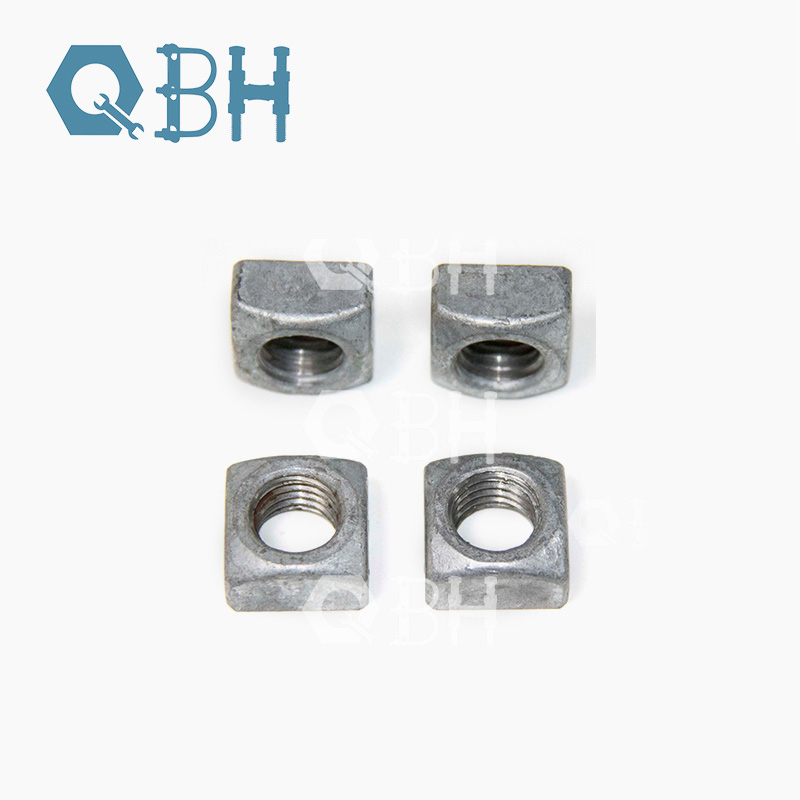Why Choose Square Nuts for Reliable Fastening?
2025-09-15
In the realm of industrial and construction hardware, choosing the right fastening solution can significantly influence the efficiency, durability, and safety of your projects. Among the array of fasteners available, the Square Nut stands out as a preferred choice for engineers, builders, and manufacturing professionals worldwide.
A square nut is a four-sided fastener that pairs with bolts or threaded rods to secure components in mechanical, structural, and industrial assemblies. Unlike hex nuts, which have six sides, square nuts feature a larger surface area on each side, offering unique advantages in certain scenarios.
Key Features of Square Nuts:
| Feature | Description |
|---|---|
| Shape | Four-sided, providing greater surface contact for stability. |
| Material | High-quality steel, stainless steel, brass, or aluminum, depending on application requirements. |
| Thread Standard | Compatible with standard metric or imperial threaded bolts and rods. |
| Surface Finish | Zinc-plated, galvanized, black oxide, or plain finish to resist corrosion and wear. |
| Size Range | Common sizes range from M3 to M24 or 1/8” to 1”, suitable for light to heavy-duty projects. |
| Application | Widely used in woodworking, metal fabrication, machinery assembly, and electrical panels. |
| Torque Capacity | Optimized for high torque without stripping, ensuring a secure and lasting connection. |
The functional design of square nuts offers superior resistance to loosening, particularly in vibration-heavy environments. Their flat surfaces make them ideal for applications where the nut needs to sit flush against the workpiece, reducing movement and distributing pressure evenly across the surface.
How Square Nuts Differ from Hex Nuts
While hex nuts dominate most fastening applications, square nuts offer distinct advantages:
-
Better Grip: The wider flat surfaces allow easier manual tightening with standard wrenches.
-
Higher Torque Tolerance: Square nuts are less prone to rounding under high torque conditions.
-
Alignment Stability: Ideal for channels, rails, and other structural profiles where alignment is crucial.
For industrial engineers and construction specialists, these differences are critical when selecting the most reliable fastener for projects demanding precision and long-term stability.
Why Square Nuts Are Preferred in Heavy-Duty Applications
Square nuts are not just traditional fasteners; they are engineered for strength, durability, and safety. Their specific design caters to environments where conventional hex nuts may underperform.
Advantages of Using Square Nuts
-
Enhanced Load Distribution: The larger contact area ensures stress is evenly spread across the surface, reducing wear and deformation.
-
Anti-Rotation Capability: In channels or slotted components, square nuts resist rotation during assembly, simplifying installation.
-
Corrosion Resistance: Depending on material selection and finish, square nuts can withstand harsh environmental conditions, including humidity, chemicals, and outdoor exposure.
-
Versatility in Material: Available in steel, stainless steel, brass, and aluminum, they cater to varying structural requirements without compromising performance.
-
Ease of Installation: The flat edges allow easy gripping with pliers or wrenches, enabling faster assembly and maintenance in confined spaces.
Practical Industrial Applications
-
Metal Fabrication: Square nuts are commonly used in frames, enclosures, and brackets where precise alignment is critical.
-
Woodworking: They offer secure fastening for beams and furniture joints without damaging the wood surface.
-
Electrical Panels: Provide reliable support for panels, connectors, and terminal blocks where vibration and heat are present.
-
Machinery Assembly: Perfect for mounting equipment and components that endure mechanical stress and heavy loads.
By understanding the industrial advantages of square nuts, project managers and engineers can make informed decisions that improve productivity, reduce maintenance, and enhance overall safety.
How to Select the Right Square Nut for Your Project
Selecting the appropriate square nut requires careful consideration of material, size, thread compatibility, and environmental conditions. A wrong choice can compromise safety, performance, and longevity.
Step-by-Step Selection Guide
-
Determine Material Requirements
-
Steel Square Nuts: High strength, suitable for heavy machinery.
-
Stainless Steel Nuts: Corrosion-resistant, ideal for outdoor and marine applications.
-
Brass Nuts: Resistant to rust, used in electrical applications for conductivity.
-
Aluminum Nuts: Lightweight, suitable for low-stress applications and decorative assemblies.
-
-
Choose Correct Thread Size and Standard
-
Metric threads (M3–M24) or imperial sizes (1/8”–1”) must match the corresponding bolt.
-
Verify thread pitch to avoid mismatched threading, which could damage both nut and bolt.
-
-
Select Appropriate Surface Finish
-
Zinc plating or galvanization for corrosion protection.
-
Black oxide for industrial environments where low reflectivity is needed.
-
-
Assess Application Load Requirements
-
For high-load machinery, choose hardened steel square nuts.
-
For lightweight assemblies, aluminum or brass may suffice.
-
-
Check Compliance and Standards
-
Ensure nuts meet ISO, DIN, or ANSI standards depending on your project requirements.
-
Correctly matching a square nut to its intended application ensures maximum performance and reliability. Proper selection reduces the likelihood of maintenance issues and enhances structural integrity in both industrial and construction environments.
FAQs About Square Nuts
Q1: Can square nuts be used in vibration-prone environments?
A1: Yes, square nuts are particularly suitable for vibration-heavy applications. Their flat edges provide greater resistance to loosening compared to hex nuts, especially when paired with flat washers. The wider contact area distributes torque evenly, minimizing the risk of the nut backing off under repeated stress.
Q2: How do I prevent corrosion when using square nuts outdoors?
A2: To prevent corrosion, select square nuts made from stainless steel or apply a protective surface finish such as galvanization or zinc plating. For highly corrosive environments, brass or coated steel options provide additional durability. Routine inspection and maintenance can also prolong service life.
In conclusion, square nuts offer unique advantages for a variety of industrial, construction, and mechanical applications. Their flat surfaces, high torque resistance, and alignment stability make them a superior choice for professionals who prioritize durability and reliability. With options available in steel, stainless steel, brass, and aluminum, and finishes that resist corrosion and wear, square nuts can meet the demands of nearly any project.
For premium quality square nuts, QBH provides a wide range of sizes, materials, and finishes tailored to industrial and commercial needs. To explore our complete product lineup and receive professional guidance on selecting the right fastener for your projects, contact us today and ensure your assemblies achieve maximum performance and longevity.



